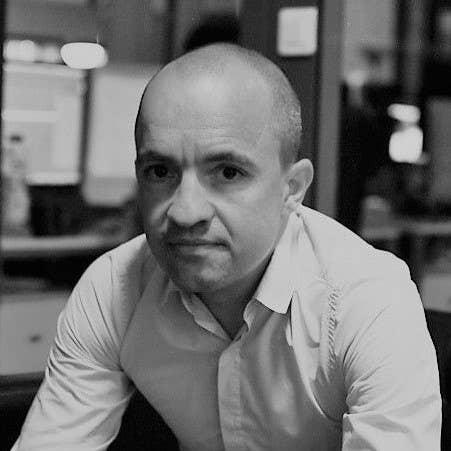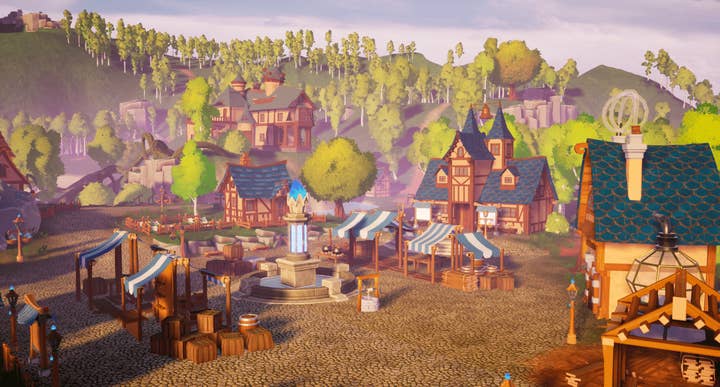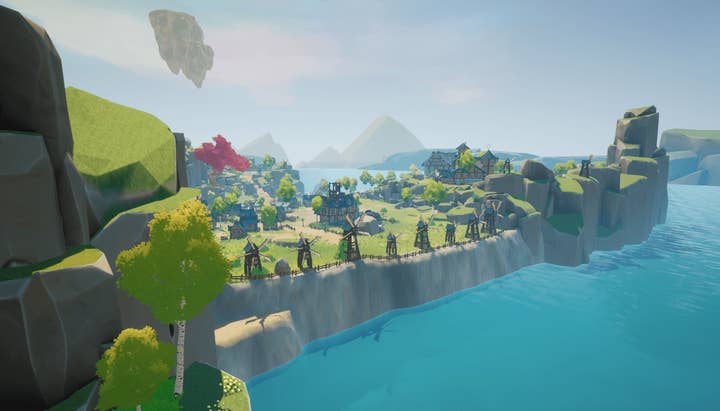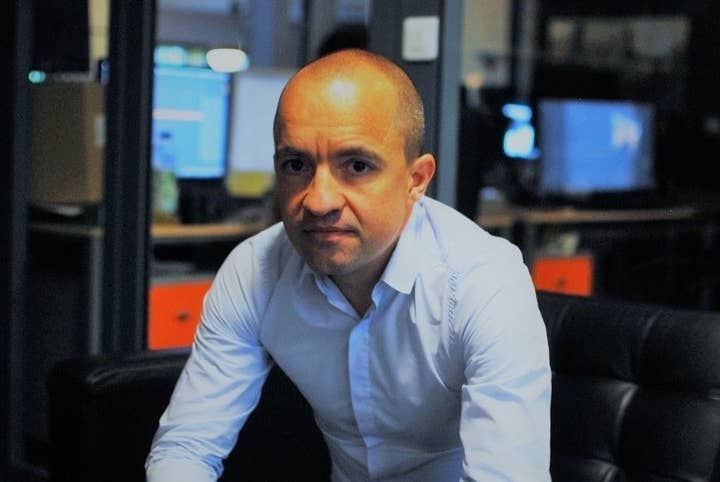Arkane Lyon director on leaving violent stealth for children's educational games
Romuald Capron on his new role at academic startup PowerZ, and leaving the Deathloop studio after 17 years
Hot off the heels of the critically acclaimed release of Deathloop, Arkane Lyon studio director Romuald Capron announced that he is stepping down from the studio after a 17-year stint at the company.
Capron has landed the executive producer role at PowerZ, a French startup focused on creating educational games content for children. The company launched a first iteration of its open-world adventure game in February this year, in which 15,000 children participated. The company also raised $8.3 million back in July to fuel its development efforts.
The game was originally launched as a closed beta on PC, but is en route to iPad and iPhone in the near future. PowerZ is also slated to release on the Nintendo Switch in 2022, and other consoles are potentially in the pipeline.

Capron learned about PowerZ's ambitious development plans a year ago, and tells GamesIndustry.biz that he really liked the pitch when he first heard it.
"I loved the concept, and I'm very attached to the education topic, because I think it's one of the ways we can, if not fix, then at least improve our world," he says. "And, of course, I'm really attached to what we can make with video games."
Quoting PowerZ CEO Emmanuel Fruend, Capron says that there are a lot of educational applications in the market, but most of them are not actually games.
"There isn't something like a 'true' game where your children don't want to stop playing, the way they play Mario or Fortnite," Capron says, nodding to the current state of education-led games. "But there will be educational content [in PowerZ], they will learn stuff in that game, it will be part of the game experience and incentive to keep on your adventure, because it's an adventure game with a strong story and so on."
The educational route is something that Capron has been interested in for a while, even more so since he became a dad himself.
"I'm very attached to the education topic, because I think it's one of the ways we can, if not fix, then at least improve our world"
"I'm very always impressed by the power of [children's] imaginations. And I don't think we give that enough of a voice," Capron says.
"Education is something that I've always been very attached to, and it's also something you're very sensitive about when you read all of the articles about video games, from outside of the games community," he explains. "When you're making big games, you ask yourself 'Am I in the wrong part of the world? Am I contributing to a bad system or not?' These are the kind of questions you ask yourself working on a game, 'Am I just making entertainment for business, for money? Can I make something different with the same medium?'"
"I was also at that time starting to think maybe I should start something new in my career, because I'm at one of the best studios in the AAA industry. So what's the next step for me?"
PowerZ has been in closed beta on PC and Mac since September with a small group of testers, and both the children playing the game and their parents/guardians can give feedback on its current state and offer new ideas.
"So far it's a kind of experimental process for us to see what works, what doesn't work and so on, to create the community because as I was saying it's one of the pillars of the project. But in the middle-to-long term, the idea is to extend it to as many platforms as possible, because one goal of the project is to make it accessible to as many children as possible.
"This includes price -- it should be free-to-play, so that it's not only for people who have the money to access an educational tool -- that's very important for us. It's a live project we will improve along the way, but I think it will take years to make it the final game that Emmanuel and his team have in mind, but it's an iterative process."
Capron also explains how beta testing with children is a little different to having adults test games -- they are much less critical of some aspects, such as unfinished textures or animations.
"The children are very open to that [giving feedback] and it's new for me, because adults are much less tolerant about loads of things like the polishing or the visuals," he says. "And actually, the children even sometimes find it fun to see that the animations or textures are not done, because they like to see behind the curtain of the process of how we make a game."

While many of the day-to-day details are different, Capron's move to PowerZ from Arkane is returning him to the days of working for a smaller start-up studio with a singular focus.
When Capron first arrived in 2004, Arkane was a small studio of 20 to 25 people and had one title under its belt -- the well-received but poor-selling Arx Fatalis. The success of the Dishonored franchise was still years away.
"Nobody knew about us," Capron says, "But we had a huge, huge ambition; we wanted to make the best game in our genre, and I feel like it's more or less the right setting for that now."
Now, thanks to Dishonored, Prey, and more recently, Deathloop, Arkane is one of the most revered AAA studios out there, and it has grown significantly as a result. As teams get bigger, the proximity to every part of a project widens. Capron found himself wanting to return to a smaller team, and the limitations that come with such.
"I like the energy of the entrepreneur when everything is possible, when you have a lot of flexibility and agility because you're small," he tells us.
"In some ways I wanted to go back to this mood and way of working. I know the challenges; when you're a big AAA studio you have more budget, more people, more experts, everyone is very, very strong in their own part. When you're smaller, you have less budget etc., but you have to be more creative also to work around all these constraints."
But Capron's decision to leave Arkane didn't manifest overnight. It was a culmination of different factors, and not an easy move to make after so long.
"I made it my job to help Arkane grow and become what they are, and I think now was the right time to leave"
"It was a long time in the same job, and a lot of pressure and a lot of stress, of course to manage. I was managing Arkane, the company plus the global projects, and it was a lot of pressure because you have a lot of investments, big budgets, and lots of people to manage," he says.
"I was also working from home in the middle of the COVID crisis, and I feel like that was the dawn for me because I got to spend more time with my family. I wanted to think about a new way to work so now I'm a bit more free.
"It was a very hard decision to make honestly. I also didn't want to leave in the middle of a project; that's why I waited until Deathloop was released. I'm very attached to the studio and didn't want to hurt them in any way.
"I made it my job to help Arkane grow and become what they are, and I think now was the right time to leave. I turned 50 in June, and maybe that's the part of your life where you say, 'Okay, should I start something new?'"

Deathloop is one of the most critically revered releases this year (see our Critical Consensus on the game here), and it would have been remiss to not ask the studio director what he thought about the game. Capron put it succinctly -- there's not a whole lot that he would change about the game's development journey. He's incredibly proud of the release, and says he and Arkane were surprised at the success.
That said, he does explain that the game hit some significant development snags as Deathloop's story evolved over time, especially in the midst of the pandemic. The team also pivoted to create the PS5 version of the title halfway through the project cycle.
"The conditions of making this game were very hard, for many reasons. The story and the history of the game was not straightforward," Capron says.
"We took a lot of risk, it was a very new model of creating campaigns with this time loop, so it was very experimental for us. I was very surprised, in many ways, by the success of the game, because we were wondering whether people would like to play this loop and see these four locations you visit all the time, the invasions and so on. All of the risks we took paid off.
"So that's really the best we can hope for when you take some kind of risk as a developer, because when you take a risk, it is to differentiate yourself from the other games, right?"

